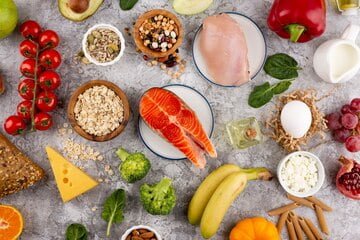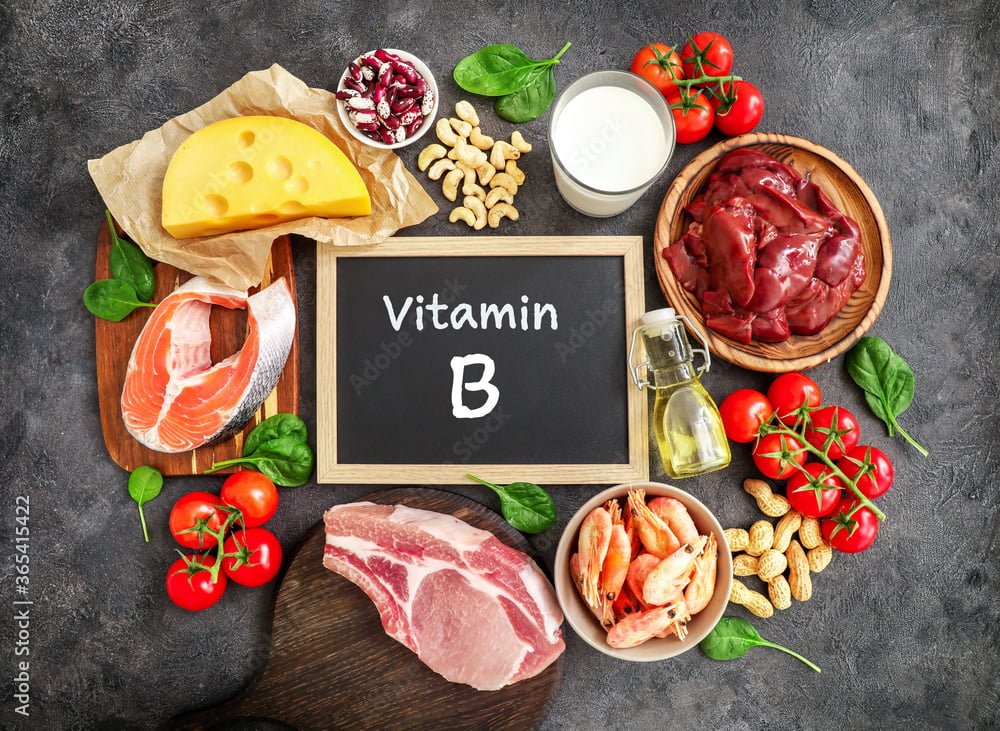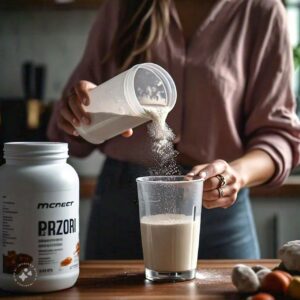I. Overview
Among the necessary elements, B vitamin is particularly important for supporting good health. This thorough guide seeks to clarify all the details surrounding vitamin, including its forms, functions, signs of shortage, and abundant vitamin B foods sources.
II. Types
This vitamin isn’t a single entity but a family of water-soluble vitamins, each with unique properties. The major types include:
III. B1 (Thiamine)
Known as the energy vitamin, Vitamin B1 plays a key role in converting food into energy. A deficiency in this vitamin can lead to serious health issues, including beriberi. Rich sources include whole grains, nuts, and pork.
IV. B3 (Niacin)
Vitamin B3 is a useful nutrient with benefits ranging from supporting heart health to promoting skin wellness. It can be found in poultry, fish, and fortified cereals. However, too much intake may lead to the infamous ‘niacin flush.’
V. B6 (Pyridoxine)
Dangerous for brain development and function, this is involved in the synthesis of neurotransmitters. Bananas, poultry, and chickpeas are superb sources. Its deficiency may lead as neurological symptoms.
VI. B12 (Cobalamin)
Vitamin B12 is important for red blood cell formation and neurological health. Found primarily in animal products, its deficiency can lead to pernicious anemia. Those following a vegetarian or vegan diet may need supplementation.
VII. Vitamin B Deficiency
Understanding the signs and symptoms of B Vitamin deficiency is essential for maintaining overall health. Common symptoms include fatigue, weakness, and neurological issues. Timely identification and correction are essential to prevent long-term complications.
VIII. Vitamin B Foods
Ensuring an suitable intake of vitamin B foods through a balanced diet is fundamental. Incorporate a variety of foods such as lean meats, dairy products, and leafy greens to meet your daily requirements.

IX. Deficiency Symptoms
Recognizing the early signs of vitamin b foods deficiency is key to addressing the issue promptly. Symptoms may vary depending on the specific vitamin B lacking, but they often include fatigue, weakness, anemia, and cognitive difficulties.
X. Vitamin B Complex Side Effects
While Vitamin B complex supplements offer an easy way to meet your nutritional needs, it’s crucial to be aware of potential side effects. Common issues include digestive problems, skin reactions, and interactions with certain medications.
XI. Deficiency Diseases List
Deficiencies can lead to a range of diseases and conditions. Beriberi, pellagra, and megaloblastic anemia are just a few examples. Understanding the link between deficiencies and diseases empowers individuals to make informed dietary choices.
XII. Vitamin B Shots
For individuals with absorption issues or those seeking a quick boost, Vitamin B shots offer an effective solution. Administered under medical supervision, these shots can rapidly correct deficiencies and improve overall well-being.
XIII. Vitamin B12 Injection
Vitamin B12 injections, in particular, are gaining popularity for their quick and direct method of supplementation. We explore the benefits, considerations, and potential risks associated with Vitamin B12 injections.
XIV. B Vitamin Rich Foods
Attaining the recommended daily intake of Vitamin B foods is attainable through a various and nutrient-rich diet. Explore a variety of foods, including seafood, dairy, and leafy greens, to ensure you get a balanced spectrum of B vitamins.
XV. Vitamin B12 Foods
For those on a plant-based diet, obtaining sufficient Vitamin B12 can be a challenge. Discover plant-based sources and fortified foods that can help vegans and vegetarians meet their B12 requirements.
XVI. Vitamin B for Dogs
Just as humans benefit from B Vitamin, our furry friends also require these essential nutrients for optimal health. Learn about the role of Vitamin B in canine nutrition and the best ways to incorporate it into your pet’s diet.
XVII. Vitamin B Complex
Vitamin B complex supplements offer a convenient way to ensure you get all the essential vitamins B in one go. We delve into the advantages, considerations, and potential drawbacks of opting for a Vitamin B complex.
Summary
In conclusion, maintaining general health and welfare requires a grasp of the complexities surrounding vitamin B. This guide provides you with the necessary knowledge to make well-informed decisions regarding your nutritional intake, covering everything from the many types and their functions to deficiency symptoms and rich food sources. Vitamin B foods is essential for maintaining a lively and healthy life, whether you are treating deficiencies, looking into supplementation, or just making dietary adjustments.
Daily intake
Certainly! Here’s a table outlining the recommended daily intake of various vitamins B foods:
| Types | Recommended Daily Intake (Adults) | vitamin B Foods Sources |
| B1 (Thiamine) | 1.2 mg | Whole grains, nuts, seeds, pork, legumes |
| B2 (Riboflavin) | 1.3 mg | Dairy products, lean meats, green leafy vegetables |
| B3 (Niacin) | 16 mg | Meat, fish, peanuts, whole grains |
| B5 (Pantothenic Acid) | 5 mg | Meat, dairy, whole grains, legumes |
| B6 (Pyridoxine) | 1.7 mg | Meat, fish, poultry, bananas, potatoes |
| B7 (Biotin) | 30-100 mcg | Eggs, nuts, whole grains, fish |
| B9 (Folate) | 400 mcg (including from food and supplements) | Leafy greens, legumes, fortified grains |
| B12 (Cobalamin) | 2.4 mcg | Meat, fish, dairy, eggs, fortified foods |
It’s important to note that individual needs may vary, and it’s always a good idea to consult with a healthcare professional for personalized advice. Additionally, some people may need supplementation, especially for B12, which is primarily found in animal products vitamin B foods source.
FAQS
1. Are vitamin B water soluble?
Yes, it is water soluble, meaning it dissolves in water and is easily excreted by the body through urine if consumed in excess.
2. Can vitamin B complex cause constipation?
B complex vitamin typically does not cause constipation; however, excessive intake of certain B vitamins, particularly B6, might lead to gastrointestinal discomfort in some individuals.
3. What vitamin B should i take?
The specific type of B vitamin you should take depends on your individual needs and any deficiencies you may have. Consult with a healthcare professional to determine the most suitable supplementation for you.
4. Where vitamin B complex found?
B complex is found naturally in a variety of foods such as meat, fish, poultry, eggs, dairy products, leafy greens, whole grains, nuts, and seeds.
5. Can vitamin B cause hair loss?
its deficiency, particularly of Biotin (B7), can potentially contribute to hair loss, but this is rare. In most cases, consuming adequate amounts of B vitamin through a balanced diet supports overall hair health.



